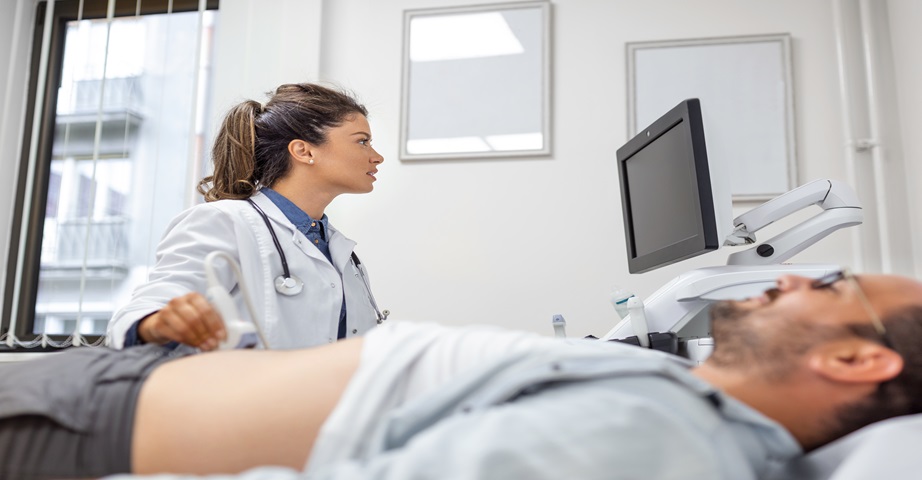SIBO - what is it? Symptoms, management, and diet

SIBO, or Small Intestinal Bacterial Overgrowth, is a condition that disrupts the balance of the gut microbiota. It is becoming increasingly recognized among patients dealing with digestive issues. This disorder can contribute to poor digestion, impaired absorption of nutrients, and consequently affect the overall functioning of the body.
What is SIBO? How does SIBO cause bloating? What are the causes of gut imbalances? Where does SIBO cause pain in the abdomen?
Table of Contents
- What is SIBO and why does it matter for gut health?
- Most common SIBO symptoms – how to recognize the issue?
- SIBO causes and risk factors - where does SIBO come from?
- SIBO Diagnosis - methods and tests
- Effective management of SIBO – from antibiotics to natural approaches
- How does diet affect SIBO? A guide to nutrition
- SIBO - recommended foods
- SIBO - foods to avoid
- SIBO and other gastrointestinal disorders
What is SIBO and why does it matter for gut health
SIBO is an abbreviation for Small Intestinal Bacterial Overgrowth, which refers to the excessive growth of bacteria in the small intestine. This condition is often informally referred to as the overgrowth of gut flora in the small intestine. It manifests as a group of clinical symptoms, mostly involving the digestive system, linked to the presence of abnormal amounts of bacteria that usually reside in the colon.
Under normal conditions, the small intestine contains a relatively small number of bacteria. However, when the body’s protective barriers malfunction, bacteria from the colon can migrate to the small intestine. This can disturb the gut microbiota balance and lead to SIBO.
It also increases the risk of impaired digestion and nutrient absorption and can gradually damage the intestinal lining.
Most common SIBO symptoms - how to recognize the issue
SIBO doesn’t always present with specific symptoms, and the issues reported by patients are often nonspecific, meaning they can also be linked to other gastrointestinal conditions. Symptoms vary depending on the type, number, and exact location of the bacteria in the small intestine. The most common symptoms of SIBO include:
- gas and bloating
- abdominal pain
- feeling of fullness in the stomach
- nausea
- constipation or diarrhea (due to difficulty digesting fats, which may lead to fatty stools, such as greasy diarrhea)
Sometimes, patients with SIBO may also experience unexplained weight loss and an enlarged waistline. An increased risk of nutritional deficiencies, especially of vitamin B12, folate, and fat-soluble vitamins (A, D, E, and K), is also common.
SIBO - skin symptoms
In addition to digestive symptoms, the overgrowth of bacteria in the small intestine can also lead to skin issues. Observations suggest that intestinal inflammation can contribute to skin inflammation, which may be related to deficiencies in important macronutrients and minerals, such as vitamin A or D.
SIBO may, therefore, contribute to acne, rashes, swelling, dryness, and itching. Additionally, it can cause skin peeling and redness.
SIBO - neurological symptoms
Although the most common symptoms of SIBO are gastrointestinal or related to the skin, psychiatric and neurological issues are becoming increasingly recognized among patients. Scientific research suggests that SIBO can affect the nervous system, potentially leading to neurological problems. One of the most commonly reported symptoms in people with SIBO is "brain fog", which results in difficulty concentrating and a sense of confusion. In some cases, patients may also experience memory problems or peripheral nerve damage.
Preliminary analyses indicate that SIBO can increase fatigue, disrupt sleep, and contribute to anxiety and depression. This is thought to be due to bacterial overgrowth negatively impacting the production of essential neurotransmitters, such as serotonin, dopamine, and GABA.
SIBO causes and risk factors - where does SIBO come from?
The primary factor contributing to SIBO is a dysfunction of the migrating motor complex (MMC) in the intestines. About 90 minutes after eating, the MMC begins a process that clears bacteria and food remnants from the intestines. Impaired gut motility and the malfunction of the MMC can lead to excessive bacterial colonization in the small intestine.
SIBO can also be linked to several conditions, such as:
- congenital and acquired anatomical abnormalities of the intestines, including intestinal strictures, diverticula, and fistulas
- disorders of intestinal motility, such as in cases of pseudo-obstruction, diabetic neuropathy, or irritable bowel syndrome (ibs)
- decreased stomach acidity
- malabsorption disorders, which can be caused by liver disease, cystic fibrosis, or chronic pancreatitis
- gastroparesis, or delayed gastric emptying
- weakened immune function, whether congenital or acquired (e.g., aids, malnutrition)
Best supplements
SIBO and autoimmune diseases
Certain autoimmune diseases can increase the risk of developing SIBO. For example, celiac disease, which involves a sensitivity to gluten, can damage the intestinal lining. This may decrease stomach acid levels, thereby facilitating bacterial overgrowth in the small intestine and the development of SIBO.
Chronic intestinal inflammation and the increased risk of SIBO are also linked to diseases such as Crohn’s disease and ulcerative colitis.
SIBO and lifestyle factors
SIBO can also be caused by an unhealthy lifestyle. Excessive stress can disrupt the vagus nerve, which connects the brain to the intestines, potentially increasing the risk of bacterial overgrowth in the small intestine. An imbalanced diet, eating in haste, and snacking between meals can also negatively affect gut health.
Regular physical activity is another crucial factor. A lack of exercise can impair gut motility and bacterial balance, increasing the risk of developing SIBO. Interestingly, excessive physical exertion may also disrupt the MMC, leading to an imbalance in the gut flora.
SIBO and medications
Certain medications, especially long-term antibiotic use, can negatively affect gut health. It is widely believed that the long-term use of acid-suppressing drugs, such as proton pump inhibitors (PPIs), may contribute to SIBO. These medications can raise the pH of stomach acid, reducing its acidity and promoting bacterial overgrowth in the small intestine.
However, recent research on the relationship between PPIs and SIBO remains inconclusive, suggesting that impaired small intestinal motility might be a more significant factor. Nonetheless, caution is advised when taking drugs that reduce stomach acid.
SIBO Diagnosis - methods and tests
SIBO can present with nonspecific symptoms that may overlap with other gastrointestinal disorders, making accurate diagnosis crucial. Although the gold standard for diagnosing SIBO is microbiological testing of the small intestine, this method is not routinely used due to its time-consuming, invasive, and costly nature.
The primary test for diagnosing SIBO is the hydrogen breath test, and increasingly the hydrogen-methane breath test. These tests involve consuming a glucose or lactulose solution and then measuring hydrogen and sometimes methane levels in the exhaled air.
This method assumes that human cells do not produce hydrogen or methane, so the presence of these gases in the breath after ingestion indicates bacterial fermentation in the small intestine, suggesting SIBO.
In some cases, additional tests may be ordered, such as:
- blood tests (e.g., complete blood count, albumin levels, vitamin b12, and folate levels)
- stool tests
- abdominal x-rays
- abdominal ultrasound
- endoscopy
Effective management of SIBO - from antibiotics to natural approaches
Many people with SIBO wonder how to treat it. The foundation of therapy should focus on addressing the root cause and alleviating symptoms. For example, in cases of anatomical abnormalities, surgery may be necessary, while patients with comorbid conditions should undergo appropriate treatment.
Treatment primarily involves antibiotic therapy aimed at reducing bacterial overgrowth and alleviating symptoms. Common antibiotics used for SIBO include rifaximin, norfloxacin, metronidazole, cotrimoxazole, ciprofloxacin, amoxicillin-clavulanate, doxycycline, or tetracycline.
If nutritional deficiencies are present, supplementation may be necessary to meet the body’s needs, particularly for B12 and folate.
SIBO and Probiotics
The use of probiotics in SIBO remains a topic of debate. Studies suggest that probiotics can be helpful, but the choice of the right bacterial strain is crucial. It’s important to note that probiotics are not a one-size-fits-all solution and may have both benefits and potential side effects in individuals with SIBO.

Supplements and herbs for SIBO
Natural treatments for SIBO are becoming increasingly popular. While the most important aspect of therapy is identifying the root cause and using appropriate antibiotics, herbs may complement traditional treatments. Herbs with antibacterial, antifungal, and digestive-supporting properties are commonly recommended.
Some beneficial herbs include:
- Berberine (OstroVit Berberine), which can inhibit bacterial growth in the small intestine;
- Oregano oil (OstroVit Oregano Essential Oil), known for its potent antibacterial properties;
- Garlic (OstroVit Garlic Extract), particularly its active compound allicin, which has antibacterial and antifungal effects;
- Turmeric and ginger (OstroVit Curcumin + Black Pepper + Ginger), which support digestive processes.
Additionally, supplements like:
- OstroVit Digezyme Digestive Enzymes can help support digestion,
- OstroVit Pharma PRO-60 BIOTIC LactoSpore can provide beneficial live bacterial cultures,
- OstroVit Vital Fiber can promote healthy digestive system function.
How does diet affect SIBO? A guide to nutrition
Proper nutrition plays a critical role in managing SIBO. The right diet can alleviate symptoms and improve daily comfort. According to the American College of Gastroenterology, people with SIBO should follow a low-FODMAP diet after completing antibiotic therapy. This diet restricts foods high in easily fermentable carbohydrates, which serve as food for bacteria in the small intestine. A low-FODMAP diet aims to limit bacterial growth and reduce hydrogen and methane production.
The SIBO diet is typically recommended to follow a three-stage intervention approach, which includes:
- elimination phase, during which all foods considered high in FODMAPs should be removed from the diet.
- Reintroduction phase, where previously eliminated foods are gradually reintroduced, while closely monitoring individual body responses.
- Stabilization phase, during which a variety of foods should be consumed, while avoiding foods that trigger unwanted symptoms, and balancing the diet to prevent nutritional deficiencies.

SIBO - recommended foods
When managing SIBO, it's recommended to consume foods that are low in mono-, di-, and oligosaccharides as well as polyols. These include:
- vegetables like eggplant, bell peppers, zucchini, carrots, cucumbers, potatoes, and tomatoes.
- fruits such as mandarins, blueberries, strawberries, kiwi, and raspberries.
- dairy products like hard cheeses, feta cheese, almond milk, camembert, lactose-free milk, and lactose-free yogurt.
- grains like spelt bread, cornflakes, corn bread, rice pasta, and quinoa.
- nuts and seeds, including walnuts, pumpkin seeds, and peanuts.
- meat, fish, seafood, as well as eggs and tofu.
People starting the low FODMAP diet often wonder about bread options for SIBO. While on dietary restrictions, bread made from 100% corn, rice, or spelt flour is allowed, as long as it does not contain wheat, rye, or barley.
SIBO - foods to avoid
Foods that should be avoided on a low FODMAP diet are those high in mono-, di-, and oligosaccharides as well as polyols. These include:
- vegetables like cauliflower, green peas, artichokes, onions, and garlic.
- fruits such as ripe bananas, grapes, plums, watermelon, and peaches.
- dairy products like milk, cottage cheese, ice cream, traditional yogurt, and powdered milk.
- grain products made from wheat, barley, and rye.
- nuts like pistachios and cashews.
- sweeteners such as erythritol, xylitol, maltitol, as well as honey and corn syrup.
SIBO and other gastrointestinal disorders
SIBO and IBS are two of the most common small intestine disorders that are closely related. Research has shown that up to 78% of people with SIBO may also suffer from irritable bowel syndrome (IBS).
How do SIBO and IBS differ?
SIBO is a condition caused by an excessive amount of bacteria in the small intestine, which can sometimes be the result of anatomical abnormalities in the body. IBS, on the other hand, is a disorder of intestinal motility that is not linked to any anatomical abnormalities.
Symptoms of SIBO and IBS can be similar, making it difficult to distinguish between the two at first glance. Therefore, proper diagnosis is crucial, as the management of small intestinal bacterial overgrowth differs from the treatment recommended for IBS.
What to do if you suspect SIBO?
If you experience unwanted gastrointestinal symptoms, or if you suffer from skin or neurological issues that impact your daily life and comfort, it’s important to consult a doctor for proper diagnosis and treatment.
For those suspecting SIBO, lifestyle changes can also be helpful. These include stress reduction, modifying the daily diet, and incorporating regular physical activity into your routine. Dietary supplements that help deliver valuable nutrients to the body may also be beneficial.

